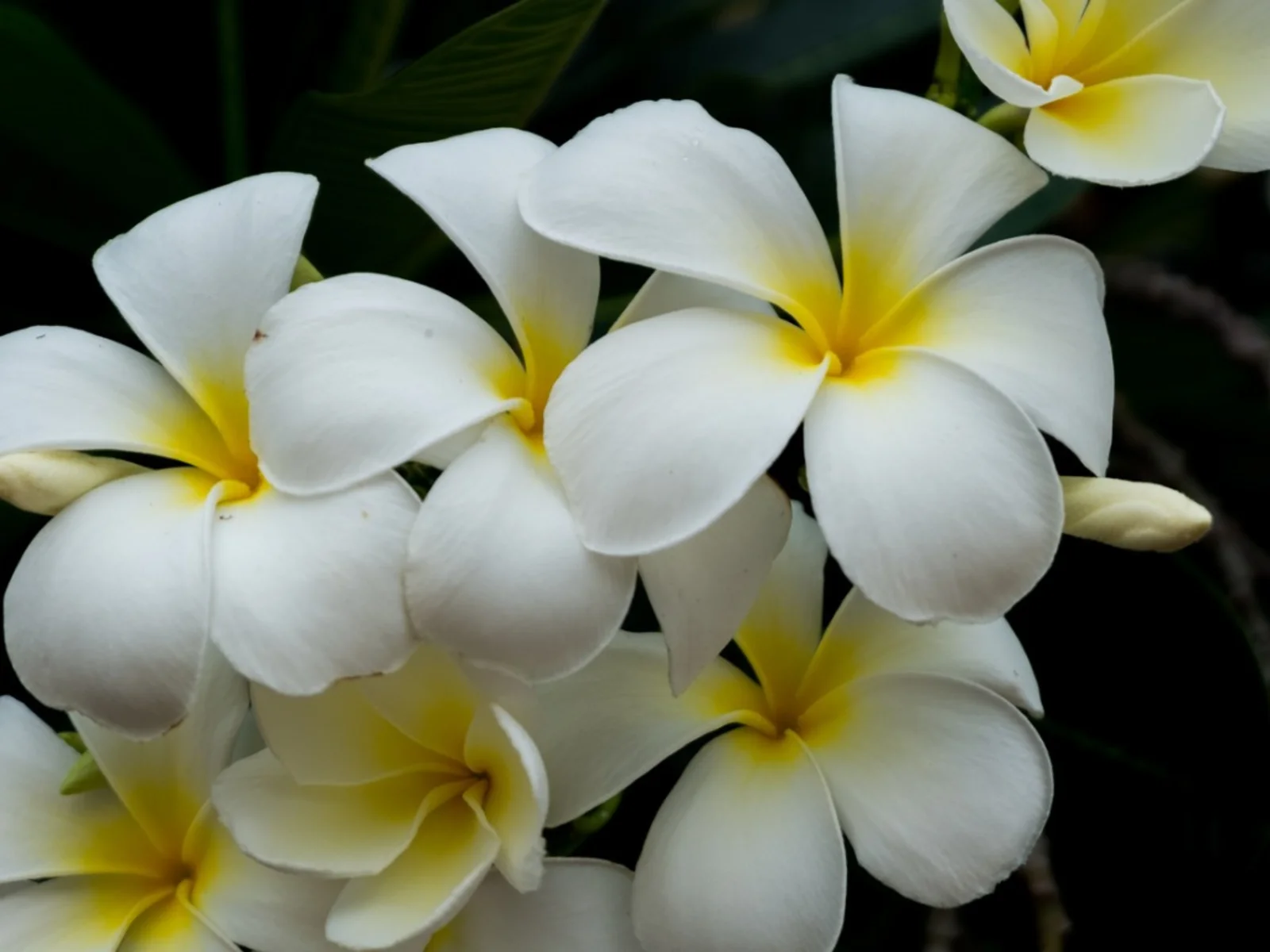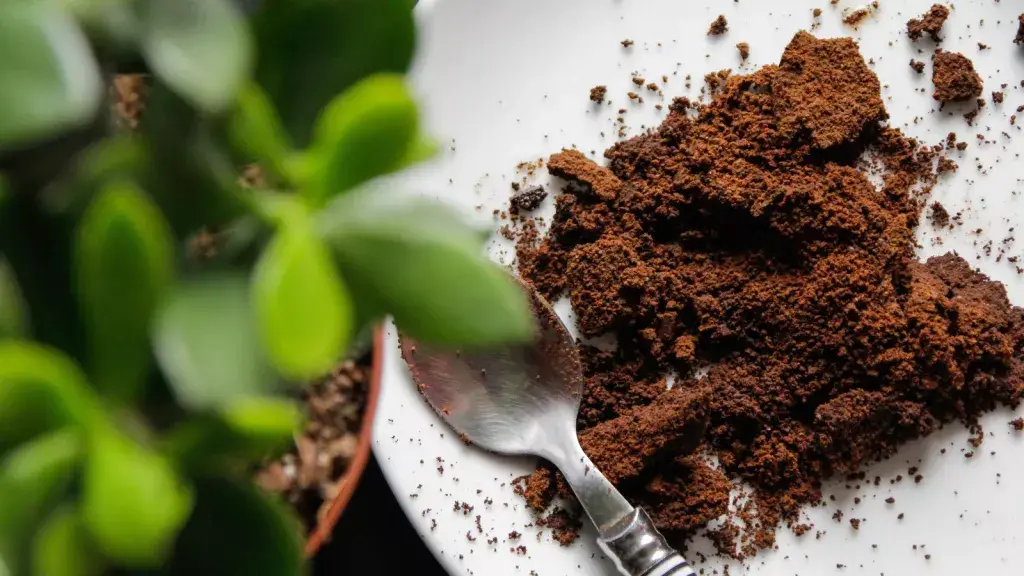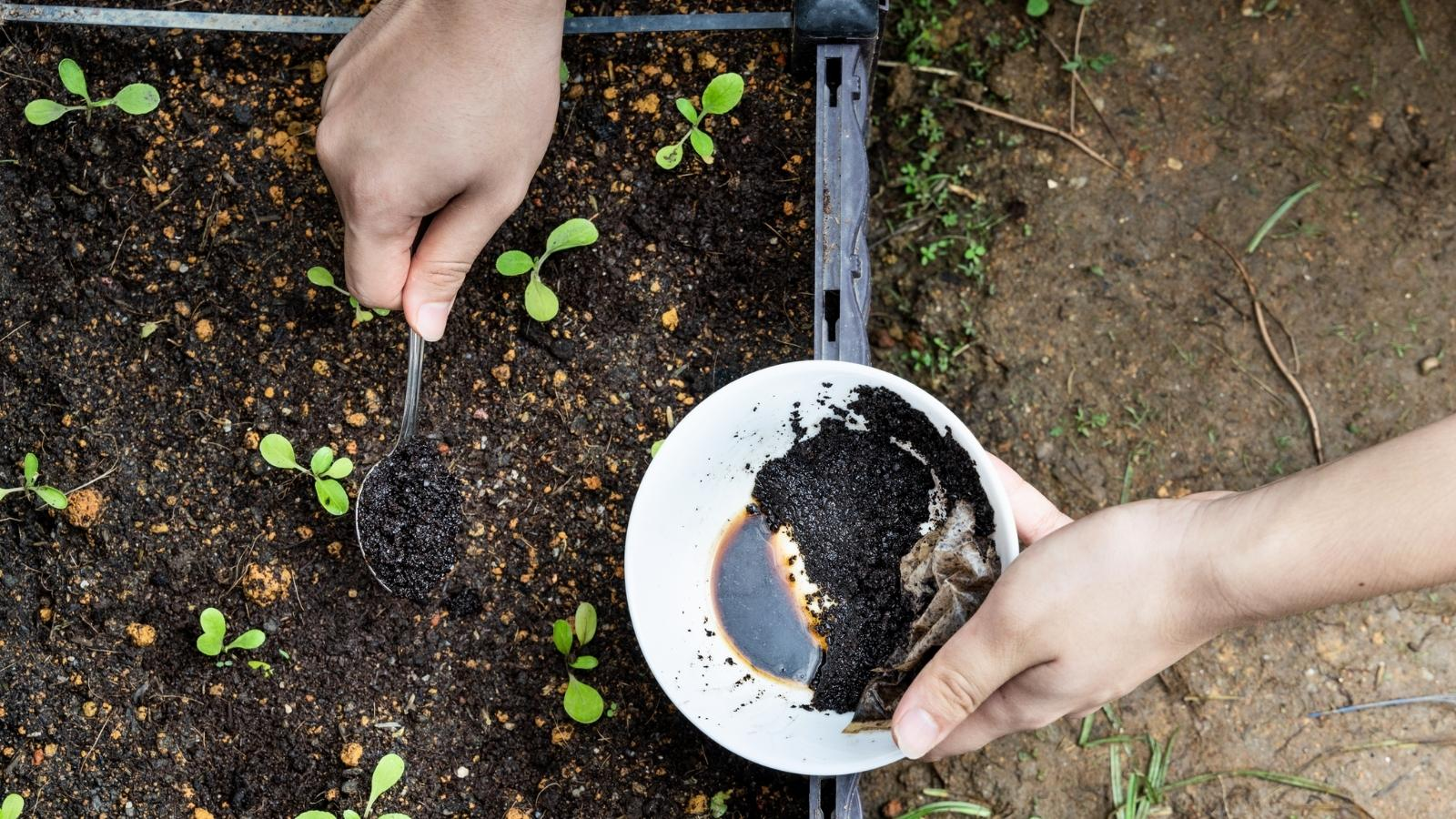Coffee grounds are popular among gardeners as a natural fertilizer and soil amendment.
But are coffee grounds good for Plumeria?
Yes, coffee grounds are good for Plumerias. They are nutrient-rich and can help Plumerias in many ways. There are many uses for coffee grounds, including fertilizer, a pH balancer, pesticide, weed controller, etc. However, it’s important to use them in moderation and in conjunction with other fertilizers and soil amendments to avoid potential negative effects.
In this article, we’ll examine the benefits of using coffee grounds on Plumerias and guide how to use them effectively.
Are Coffee Grounds Good For Plumeria?
Coffee grounds can provide beneficial nutrients for Plumeria plants due to their content of nitrogen, phosphorus, and potassium. However, it is important to use them in moderation to avoid overloading the soil with these nutrients, which can be harmful to the plant. In such cases, Plumeria stems may get wrinkled.

Benefits of Coffee Grounds For Plumeria:
There are several benefits that can be derived from coffee grounds for Plumeria plants when used properly. Using coffee grounds in moderation can be both beneficial to the environment and economical for improving the health and growth of Plumeria plants.
Source of Nutrients:
Coffee grounds are a rich source of nitrogen, phosphorus, and potassium, which are all important nutrients for plant growth.
Among all the nutrients necessary for plant growth, nitrogen is one of the most crucial and is responsible for healthy foliage growth. Coffee grounds contain approximately 2% nitrogen, which can help supplement the soil with this important nutrient.
Phosphorus is another important nutrient for plant growth, as it is responsible for root development, flower production, and seed formation. Coffee grounds contain small amounts of phosphorus, which can help support these aspects of Plumeria growth.
Potassium plays an important role in plant health because it promotes endurance, vigor, and flower production. There is a good amount of potassium in coffee grounds, with approximately 0.6% potassium content.
Adding coffee grounds to the soil can slowly release these nutrients over time, providing a steady supply of nutrients for Plumeria plants to grow and thrive.

Soil Amendment:
Coffee grounds have a coarse texture and can help loosen compacted soil, improving the soil’s overall texture and structure. This can make it easier for Plumeria roots to penetrate the soil and access the nutrients they need for healthy growth.
In addition, coffee grounds can improve soil drainage, as their texture allows water to flow more easily through the soil. This can help prevent soil compaction and waterlogging, which can be harmful to Plumeria plants.
Pest Deterrent:
There are a number of compounds found in coffee grounds that can be toxic to certain pests, such as slugs and snails. Coffee grounds may even keep armadillos away!
Whenever these pests are made to come into contact with coffee grounds, they can be repelled or even killed, helping to protect Plumeria plants from damage.
In addition, coffee grounds can help deter other pests, such as ants and cats. Coffee’s strong aroma can mask Plumeria plants’ scents, making them more difficult for pests to detect. The use of this technique is particularly beneficial during the early growth phase when Plumeria plants are more vulnerable to damage.
Balancing pH:
The Plumeria plant thrives in slightly acidic soils, with a pH level between 6.0 and 7.0. If the soil pH is too alkaline, Plumeria plants may struggle to absorb certain nutrients from the soil, leading to stunted growth and poor flower production.
Coffee grounds can be a great option for balancing the soil pH for Plumeria plants because they are mildly acidic. In addition to raising the soil pH to a more optimal range for Plumeria plants, they can help lower the soil pH to a more optimal range for Plumeria plants.
Weed Control:
Coffee grounds contain caffeine and other compounds that can inhibit the germination of some weed seeds, making them a natural weed control method. By adding coffee grounds to the soil, they create an environment that is unfavorable for weed growth and can help suppress weed growth.
Controlling weeds for Plumeria is important because weeds can harm by competing with them for essential resources such as nutrients and water. This will lead to stunted growth and poor flower production.
Weeds can also harbor pests, like aphids and spider mites, which can cause damage to the leaves and flowers of the plant. Additionally, some weeds can host plant diseases that can spread to Plumeria plants and cause further damage.
Attracts Earthworm:
Coffee grounds are a rich source of organic matter, which is an important food source for earthworms. After coffee grounds have been added to the soil, earthworms are attracted to them and will consume the coffee grounds as they break down.
Earthworms create tunnels and burrows that allow air and water to freely circulate, aerating the soil and improving its structure.
In addition, the digestive process of earthworms helps to break down the coffee grounds and release their nutrients back into the soil, making them available for plant uptake. This can further improve soil health and fertility, as the nutrients released by earthworms can help support healthy plant growth and flower production in Plumeria plants.
How to Properly Use Coffee Grounds For Plumeria
Coffee grounds have multiple uses for the betterment of your Plumeria plant. On top of that, you can use coffee grounds in multiple ways.
Method One: Direct Application
Direct application of coffee grounds to soil involves simply spreading the used grounds on the soil surface around plants.
The best way to recycle used coffee grounds is to collect them from your coffee maker or from any local coffee shop. When applying the grounds to the soil, make sure to allow them to cool for at least 30 minutes before applying them. Evenly spread the coffee grounds around the base of your plants, being careful not to cover the stem or foliage. It is recommended that you mix the grounds into the top layer of soil with the help of a rake or gardening tool.
Method Two: Compost
Composting coffee grounds are an excellent way to recycle used coffee grounds and turn them into a nutrient-rich soil amendment that can be used to fertilize your garden. Here’s how to compost coffee grounds:

- Collect used coffee grounds.
- To create a balanced compost, it’s important to add other organic “brown” materials to the compost bin such as leaves, straws, shredded paper, etc.
- You will want to mix all the ingredients starting at the bottom with a layer of “brown” material. Add the coffee grounds in thin layers throughout the compost bin, being sure to mix them in with the other materials.
- Keep the compost moist but not waterlogged, and mix it regularly to promote airflow and speed up the decomposition process.
- Once the compost has broken down into a dark, crumbly soil amendment, it’s ready to use in your garden. Be careful not to cover the stems or foliage with compost when spreading it around the base of your plants.
Method Three: Mulch
Mulching with coffee grounds is a great way to keep your plants healthy and suppress weed growth in your garden. Here’s how to mulch with coffee grounds-
- Before applying the coffee grounds, remove any weeds or debris from the soil and loosen the top layer with a rake or hoe. This helps to improve the soil’s water-holding capacity and allows the coffee grounds to penetrate the soil more easily.
- Using coffee grounds, spread a thin layer around the base of your plants. Also, make sure that the stems and foliage of your plants are not covered by the coffee grounds. The layer should be no more than half an inch thick.
- After applying the coffee grounds, water the area thoroughly to help the grounds settle into the soil and release their nutrients. By using coffee grounds in the soil, you will be able to retain moisture in the soil and will not have to water it frequently.
- On top of the coffee grounds, you can add a layer of organic mulch, such as shredded leaves or wood chips, as an additional layer of protection. This helps to further suppress weed growth and improve soil health.
Method Four: Vermicompost
If you have a worm bin, coffee grounds can be a food source for your worms. The worms will break down the coffee grounds and produce nutrient-rich worm castings that can be used as a soil amendment.
- Choose a suitable worm bin and bedding material for your worms, such as shredded newspaper, coconut coir, or peat moss. Add the bedding material to your worm bin and moisten it with water until it feels like a damp sponge.
- Spread a thin layer of coffee grounds on top of the bedding material, being careful not to overfeed your worms. When feeding your worms, you should only give them as much as they can consume within a few days.

- Cover the coffee grounds with a layer of bedding material to help prevent fruit flies and other pests from accessing the food source. Further reducing pest risk, you can also cover the bedding material with shredded newspaper or cardboard.
- Check your worm bin regularly to make sure that the bedding material is moist and that your worms are actively breaking down the coffee grounds. Adding a small amount of water will moisten the bedding material if it becomes too dry. To help absorb excess moisture, add more bedding material to the bin if it becomes too wet.
- After several weeks or months, the coffee grounds should be fully broken down and transformed into nutrient-rich worm castings. Harvest the worm castings by removing the top layer of bedding material and collecting the dark, crumbly castings from the bottom of the bin.
Method Five: Liquid Fertilizer
Making a liquid fertilizer from coffee grounds is a simple and effective way to provide your plants with a boost of nutrients. Here’s how to make liquid fertilizer from coffee grounds-
- Collect used coffee grounds and a container large enough to hold them.
- Add a cup or two of used coffee grounds to your container.
- Put coffee grounds in the container and fill it with water until they are completely submerged.
- Cover the container with a lid and let it sit for a few days, ideally for up to a week. The nutrients present in the grounds of coffee can be absorbed by the water as a result of this process.
- After steeping, strain the liquid through a strainer or cheesecloth to remove the grounds. You should notice that the resulting liquid has an earthy smell and a dark color.
- It is recommended that you dilute the liquid fertilizer with water at a ratio of 1:10. You can water your plants directly with the liquid fertilizer or mist the leaves with it using a spray bottle.
Frequently Asked Questions (FAQs):
What Helps Plumerias Grow?
Plumerias require direct sun to flower and perform best in full sun. During the summer growing season, they require evenly moist soil, but should be allowed to dry slightly between watering’s to avoid root rot.
How Often Should I Water A Plumeria?
It is recommended that you water plumerias once or twice a week to maintain their health. But during the rooting stage, it’s important to let the soil dry out between waterings to encourage root formation. Overwatering of a plant can lead to root rot, which is one of the most serious causes of death to a plant.
Can Plumeria Take Full Sun?
Yes, Plumerias require full sun or partial shade in the garden to thrive. However, they are not very tolerant of cold weather, so it’s important to consider planting them in a pot with drainage holes that can be brought indoors during cold winters.
Conclusion
So, are coffee grounds good for Plumeria? The high nitrogen content of coffee grounds and their ability to improve soil structure can be beneficial to Plumerias. But, you should only use them in moderation and in conjunction with other fertilizers to avoid potential negative effects on the plant.
Another thing: it’s essential to ensure that the coffee grounds are brewed to prevent potential harm to the plant’s roots.
- Why Are There Still No Tomatoes in My Tomato Plants? Let’s Fix the Issue! - July 13, 2023
- Water Propagation White Stuff on Roots: Everything You Should Know! - July 11, 2023
- String of Dolphins Drying Up: Solved! - July 11, 2023
